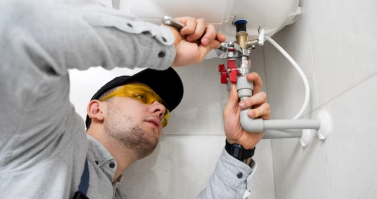There’s nothing like a cold shower to remind you that your water heater isn’t what it used to be. Whether it’s inconsistent temperature, strange noises, or a leak on the floor, these signs leave homeowners wondering: is this fixable, or is it finally time to replace? Knowing the water heater’s lifespan can help you avoid both unexpected breakdowns and unnecessary replacements.
What’s the Average Water Heater Lifespan?
Most traditional tank-style water heaters last between 8 to 12 years. Tankless models can push beyond 15 with the right maintenance. If your heater is nearing or past that age, even minor issues may signal the end of the road. In many cases, components like thermostats and heating elements can be replaced affordably—but only if the unit is relatively young. Once rust, sediment buildup, or corrosion sets in, those repairs may offer only temporary relief.
It’s important to consider usage, too. Households that consume a lot of hot water—such as larger families—tend to wear out water heaters faster. Likewise, homes with hard water often see accelerated wear unless a softening system is in place. If you’re unsure how old your unit is, check the manufacturer’s label on the tank or ask a qualified technician during your next plumbing repair in Schaumburg.
The Hidden Costs of Holding On
Hanging on to an older water heater might seem economical in the moment, but there are long-term costs that often go unnoticed. An aging unit tends to work harder and less efficiently. That means higher energy bills and slower recovery times. You might also find yourself calling for frequent water heater repair in Northbrook, especially if you’ve already replaced parts more than once.
If your tank is leaking or showing visible signs of deterioration, replacement is usually the only safe choice. Leaks can cause structural damage, mold, and unnecessary stress. Plus, today’s newer models—especially Energy Star-rated options—offer major improvements in efficiency and reliability.

Repair vs. Replace: What’s Right for You?
It all comes down to a balance of age, condition, and performance. If your unit is under 7 years old and the issue is isolated (like a worn-out valve or faulty thermostat), repair often makes sense. But if your unit is over a decade old and showing signs of inefficiency or corrosion, replacing it may save you money—and headaches—down the road.
For homeowners focused on comfort and budget, making this call isn’t always straightforward. That’s why it’s worth getting a professional inspection from a team that understands both modern upgrades and legacy systems. Whether you’re looking to extend your unit’s life or start fresh, residential plumbing in Bolingbrook doesn’t need to feel like guesswork.
Unsure about your water heater’s lifespan? Let FlowPro Plumbing inspect your system and help you make a smart, long-term decision that fits your home and budget.


